Big Boys creator Jack Rooke on being ‘suspicious’ of fans, queerness, and what questions people ask him the most
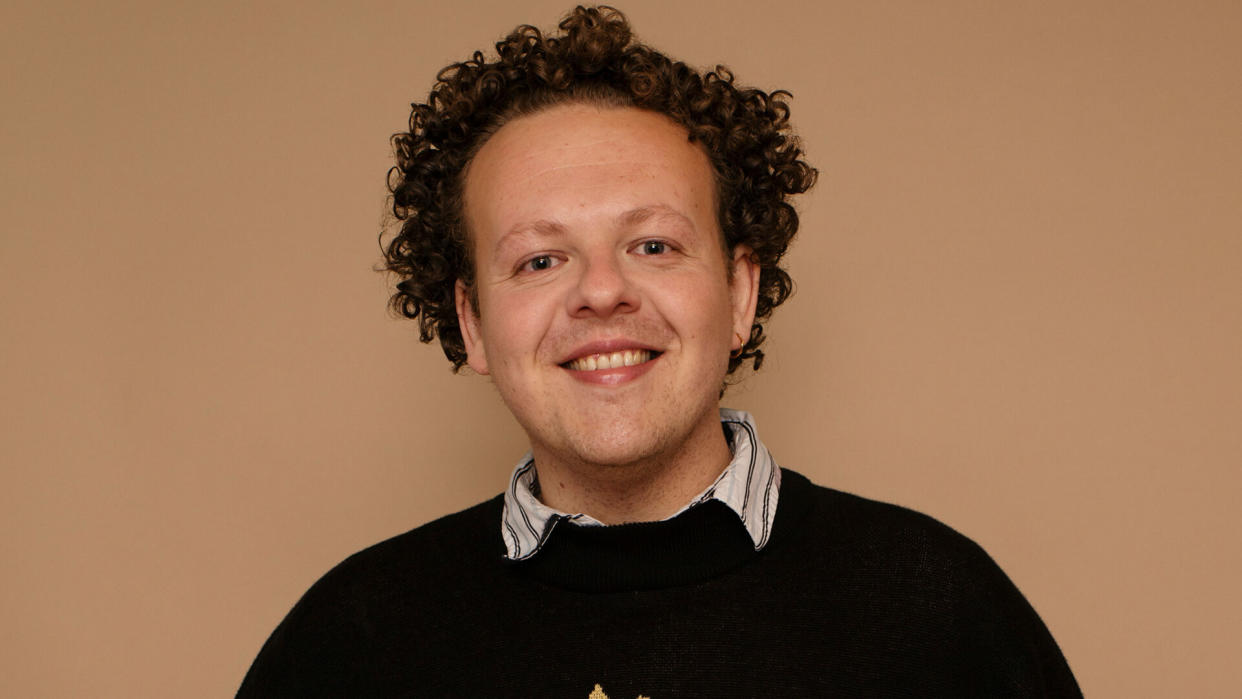
The second series of Big Boys is with us. After an enchanting first series, many have been eager to get back to Brent University and find out what Jack (Dylan Llewellyn), Danny (Jon Pointing), Corinne (Izuka Hoyle), and Yemi (Olisa Odele) have been up to.
For Attitude’s January/February issue – out now – we spoke with the show’s leading men about the series, dealing with grief, sexual content, and more. Attitude was also joined by writer and creator of Big Boys, Jack Rooke.
During the shoot, we sat down with Rooke to go over some of the themes of the show as well as where his ideas for this brilliant but touching comedy come from.
We spoke to you in 2022 after Big Boys Series 1 came out, and you said you were suspicious about people loving the show. Do you still feel that way?
I’m still suspicious. Coming from a live comedy background the people I want to impress the most are stand-up comedians. I want to make sure there are enough daft jokes in there to earn the moments of pathos. It’s like a horrible Stockholm Syndrome. So far, I think they’ve respected that.
How have you found balancing the comedy and serious stuff?
I’m really lucky I get to write it completely by myself. As it’s led by my own experience that sets the temperature of what is funny because I write the truth. Maybe that’s why people have responded in such a lovely way, there’s an authenticity to the experiences being both funny and traumatic. I think a little bit less of it when I’m writing it. And when we’re about to film, we do a big read-through, that’s when I’m like, ‘Fucking hell! I’ve got to make sure there are loads of gags in here! But then there’s enough mental health stuff to keep my OG girlies happy. I try not to think of it from too much of a contrived place at the beginning. I just write what I know and then adapt that and see where the balance is afterward.
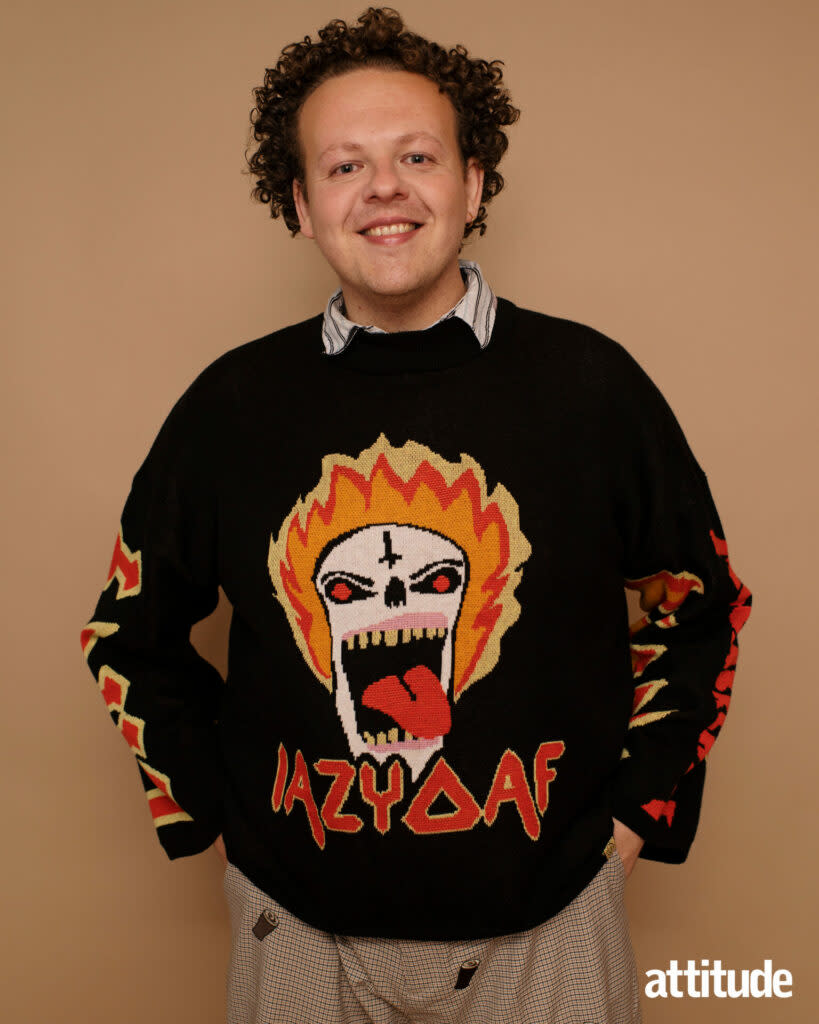
Did you want Big Boys to go to Channel 4 originally or did you shop it around?
We made the pilot for the BBC in 2018. On set, we were all like ‘This is more of a Channel 4 show’. It felt a little bit less youth-orientated than it sounds on paper. I think our viewers are way broader than that and it tips into being more of a family comedy in the vein of Gavin and Stacey. That was always my ambition, I wanted to write stories about my mum and her being a widow and working class who often feels invisible.
So, when the opportunity was there to take it to Channel 4, I realised we would be able to expand the world more. It could be more about family. I think a real highlight of series two is Cousin Shannon, who is the character I’ve always wanted to write. She’s more like me than Jack is in a weird way. I’ve got the anxious underpinning of Jack but with the Watford online girliness of Shannon.
What do people want to talk to you about when they stop you?
They ask me if Jon Pointing is single. And I say, I’m very good friends with his wife. His wife’s the funniest person I know. She’s an amazing performer and one day, I will work with her. People ask quite in-depth questions about the story and what’s real and whatnot, which is really nice. At the Attitude Awards last year a guy spoke to me for, like, 45 minutes about his best friend, who was a straight guy at uni, and how he got over being a shy gay guy. People have really responded to that.
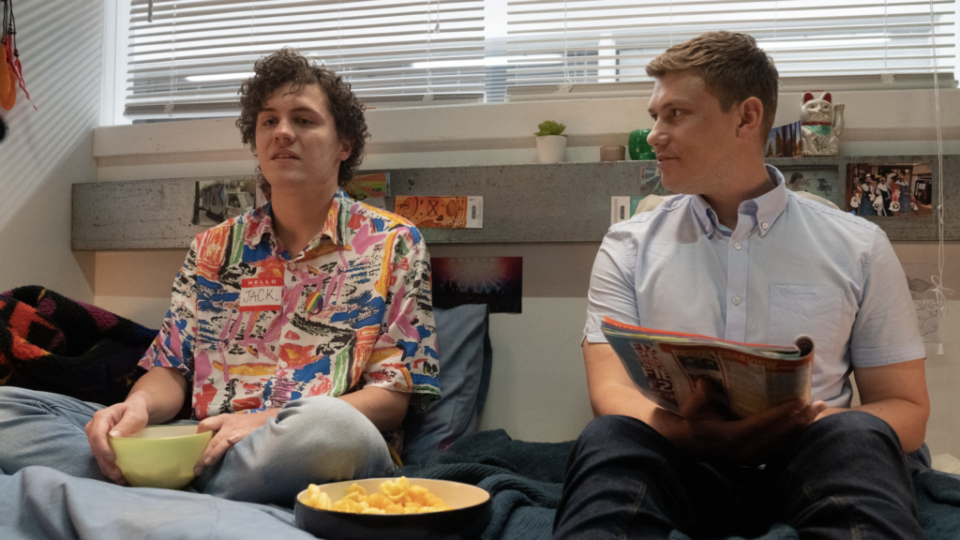
You tackle grief with comedy in the show, and sometimes that is the only way through tragedy. How closely does the show match your personal experience?
When my dad died, I was about 15 or 16. It really was, like, laughing and crying a lot and treading that line between the two and how connected they are as physical releases. My mum’s incredibly funny and her coping mechanism throughout most of her life, I think it is for a lot of working-class women, is humour. When you go through something really awful, that humour doesn’t necessarily get dampened by all the trauma. If anything, it becomes more crucial, and I try to celebrate that within Big Boys.
Does it feel bittersweet at all having the show be so successful?
This is an annoying thing to say in an interview, but I don’t know the answer to that. I’ve got to finish it and then I’ll know. I think once it’s done, I’ll be able to look back and be like, ‘Why the fuck did I do that?’
I don’t think it’s bittersweet because it’s the thing that got me through it all, being able to make something creative and having that tool as a means of expressing. The best thing about making Big Boys is that I get to make it with some of my best, oldest, closest friends. And they also just happen to be really fucking good. I write it to play to their strengths and what I know they can do, but they also act it knowing my strengths and my vulnerabilities and how making a show like this can be difficult for me.
Dylan [Llewellyn] and Jon [Pointing] check in on me probably more than I check in on them. I think the cast resonate with the story. And they’ve met a lot of my family and friends, and they want to get it right. I think they’ve helped me realise why I’m writing it when sometimes I don’t like to think about that too much.
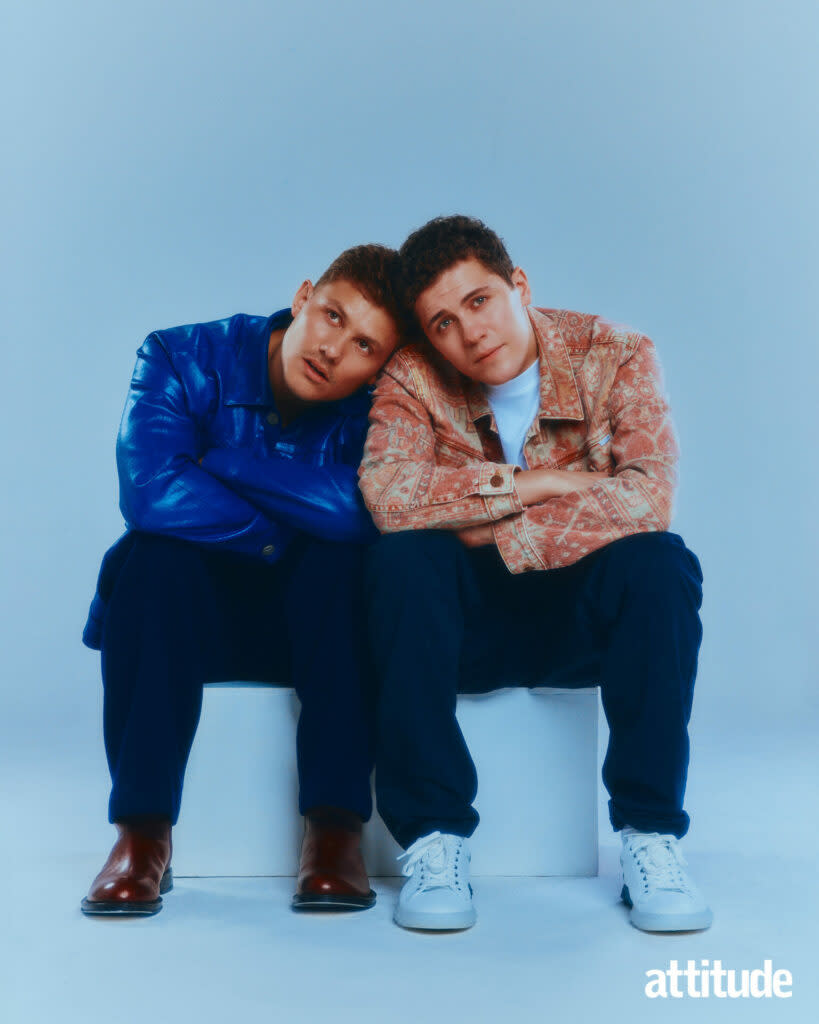
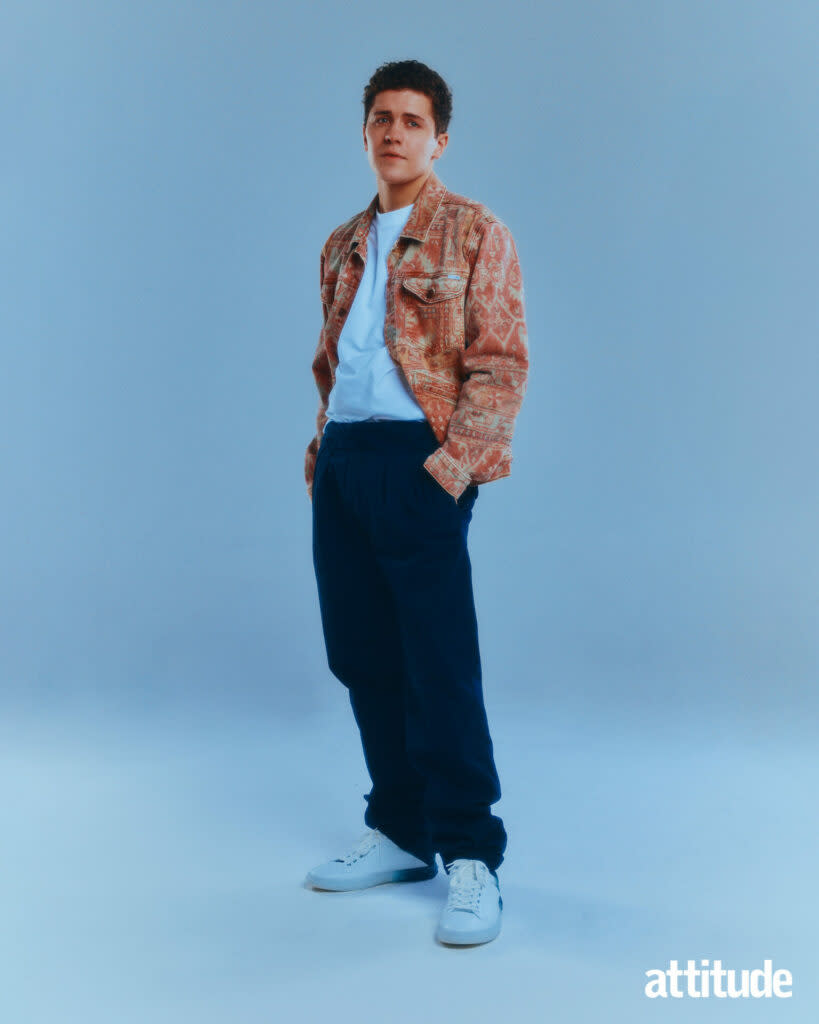
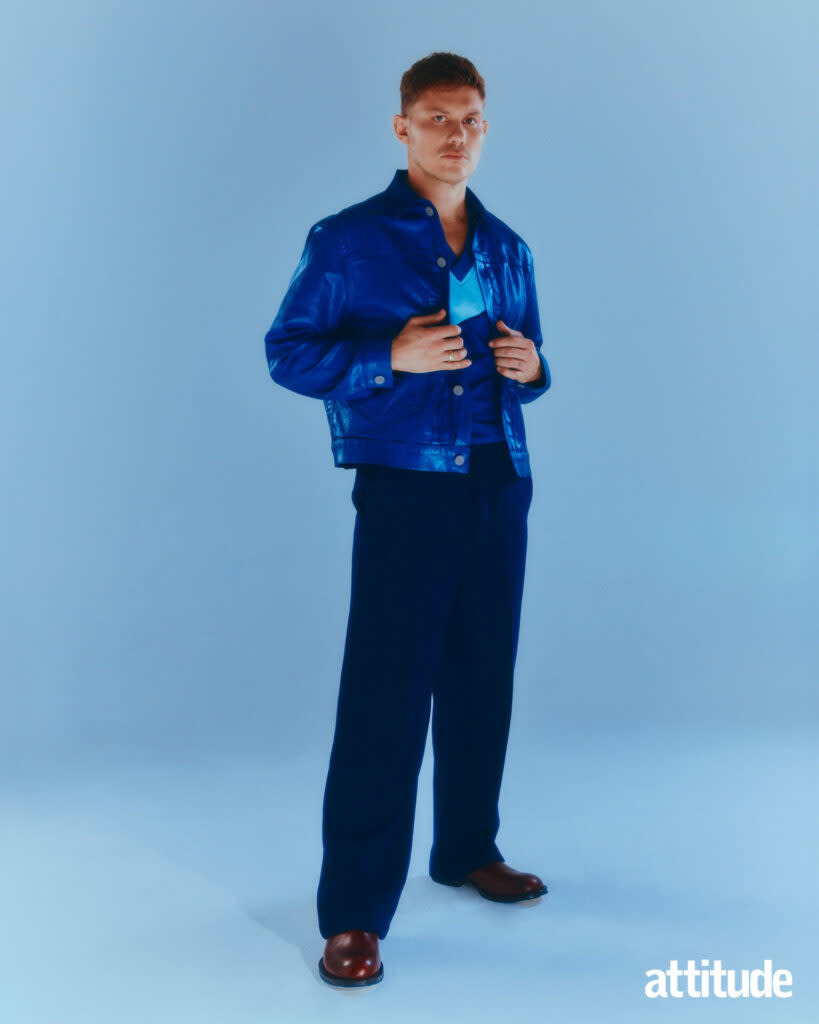
How does it feel to be part of a movement in queer storytelling along with shows like Heartstopper and Wreck away from trauma-centric narratives?
It’s really lovely. And I think Alice [Oseman] and Ryan [J. Brown] are brilliant. As writers, we need to talk a lot and have each other’s backs. Because the positive influences that we write then trickle down to how the stories are told and how they’re edited and presented. The thing I was most anxious about in series one was the coming out scene in episode six.
I know that there are a lot of people online that are like, ‘Every gay story is always about coming out. It’s always about this one moment.’ The coming out scene is a red herring. What Jack’s really saying is, ‘I am not going to be able to tell my dad something about my life.’ Coming out to my mum was never a worry about any of the traditional stereotypes of coming out. It was like ‘Fuck, it’s the first big thing in my life that I’m not going to be able to tell my dad.’ I made sure every single line was driven by grief. Jack’s worried about the relationship with someone who isn’t here anymore. Often in shows that deal with grief, it’s all about getting over the grief.
What I wanted to carry on into series two is that you don’t get over it, your relationship with that person just changes. You still remember them, and you still have sad moments. I wanted to remind everyone of that in episode four of the second series, those things are still happening.
What was behind the decision for Jack coming out to Danny be such a subtle moment?
I did that lovely piece when I got the Breakthrough Award at the Attitude Awards. In the interview, I said I don’t walk about Sainsbury’s thinking I’m gay all the time. What I meant was the experiences of losing my dad, having my own struggles with mental health, or being really skint and living in property guardianships, and watching family members struggle against the backdrop of fucking austerity, being gay is, like, six on the list of difficult things. I don’t say that to downplay the struggles that people go through with their sexuality. If that’s number one on your list, that is fine.
But I think that is important to have in a TV show, a character who’s queer, and is trying to figure out the parameters of that, but also has five other things going on. That’s way more realistic, which is why Jack didn’t really come out to Danny. I don’t think, in Jack’s mind, it was as much of a big deal as it could have been. It’s that moment where we see the two of them choose each other and be there for one another. When you have that, it doesn’t need any more explaining. But I wanted that nonchalance from the straight character to come in. And for it to be subtle. Jon did that really beautifully in his performance as well.
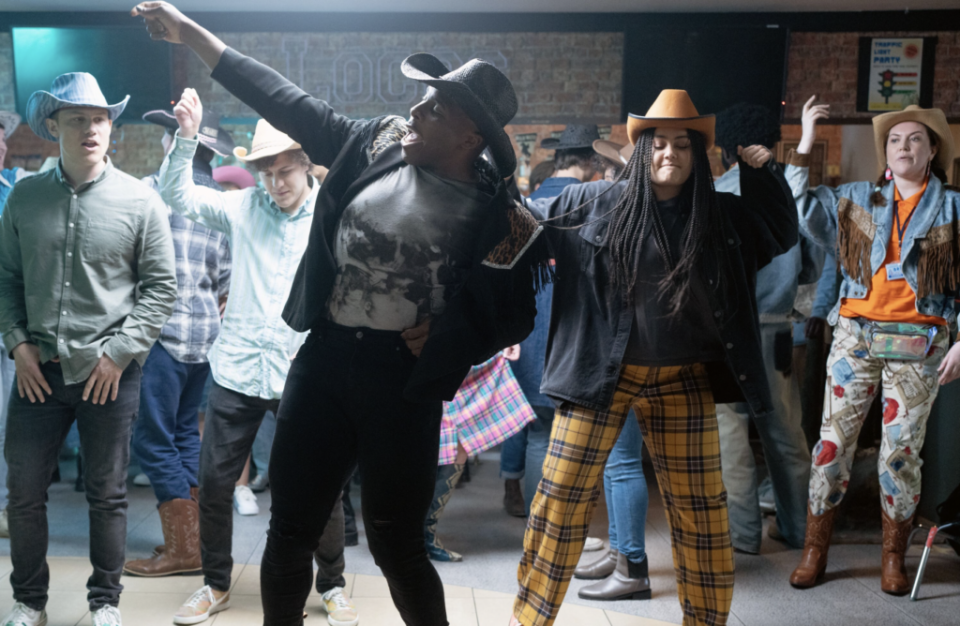
With Dylan’s character Jack being based on you, what conversations did you two have?
If I could go back and rename the character to not have my name, I would. I don’t think that Dylan is necessarily playing an exact version of me. There’s a lot of me in Danny, there’s a lot of me in Yemi, there’s a lot of me in Shannon. But with Jack, I used to be incredibly anxious, I used to feel vulnerable in a lot of social situations.
Dylan does such a beautiful job of portraying the vulnerabilities of Jack in a way where he doesn’t need to be an exact replica of what I was like. He just needs to feel like a character that’s authentic, and that you’re rooting for even when he’s being a wet blanket. I love Danny calling him a dweeb because I would call myself that sometimes. But Dylan is so good, he asks a lot of questions, and he spends a lot of time with the script. He really is dedicated to figuring out the parameters of the character. Especially in series two, I just trusted him.
Touching on the debate about who should play queer roles, what are your thoughts?
I try to not pry about who’s queer and who’s not. Purely because I think sexuality has changed. I’m way less likely to define myself now as a gay man. I would rather be defined as queer. The flexibility I would like to be afforded to me is something that I try to afford to other people. When I first met Jon and Dylan, I knew I could trust them to know and empathise with what I’ve been through and with what the people I’m writing about have been through for me to not have to worry is this portrayal of sexual discovery realistic? I didn’t go around asking Jon ‘How depressed have you been?’
I think there’s definitely a great deal of validity in wanting queer portrayals to be as authentic as possible. But I don’t need to know the ins and outs of everyone’s personal history. My instincts are completely right on knowing that people can deliver this really well. And I think sometimes to simplify the complexities of people, you run the risk of shutting down what a show can be. Big Boys defies that a lot. In episode six Izuka Hoyle has a moment that comes out of nowhere and it’s brilliant. I have no clue if she had any experience in at all, but I just trust my instincts on stuff.
Big Boys series is streaming now.
The post Big Boys creator Jack Rooke on being ‘suspicious’ of fans, queerness, and what questions people ask him the most appeared first on Attitude.


